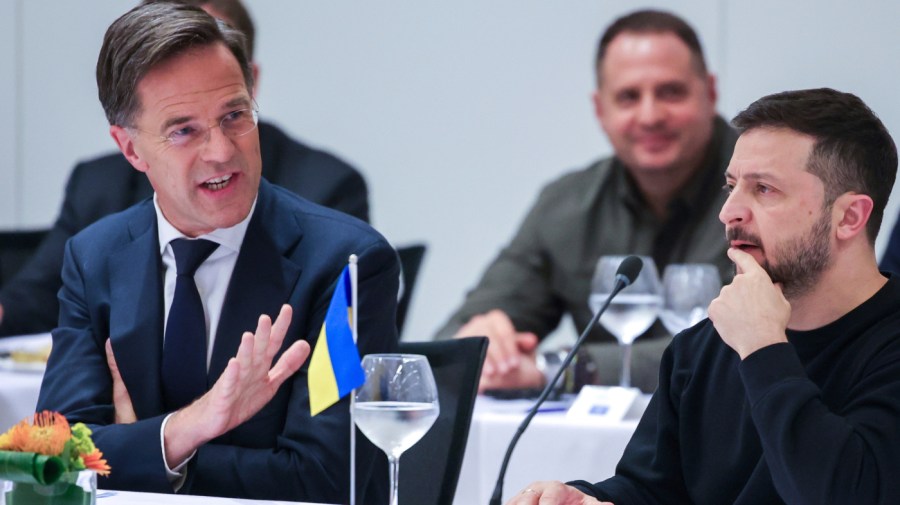[ad_1]

A window of opportunity to end the conflict in Ukraine has opened with President Donald Trump’s reelection and his expressed intention to end the war.
To achieve peace, Western countries should consider supporting Ukraine’s transition to a neutral state. While this path may seem contentious, it presents the most viable solution to end the war and foster long-term regional stability.
Before Russia’s full-scale invasion of Ukraine, Moscow consistently advocated for Ukraine’s neutrality, emphasizing its staunch opposition to Ukraine’s aspirations to join NATO. In December 2021, Russia put forward a series of proposals to establish a neutral Ukraine, seeking legally binding guarantees. However, Western countries and Ukraine rejected these demands, citing the importance of Ukraine’s sovereignty and right to self-determination.
Now, nearly three years into the conflict, President Vladimir Putin continues to assert that Ukraine’s neutrality is essential for peace.
In a recent address, Putin stated, “If there’s no neutrality, it’s hard to imagine any kind of good-neighborly relations between Russia and Ukraine.” While agreeing to neutrality under pre-war circumstances might have been viewed as a compromise of Ukraine’s autonomy, the realities on the ground today make it a necessary consideration for ending the hostilities.
One of the reasons for Western countries to support Ukraine’s neutrality is the potential for reducing military tensions between NATO and Russia. A neutral Ukraine would act as a buffer state, minimizing the immediate risk of escalation and curbing the threat of a broader conflict in Eastern Europe. This reduction in hostilities would contribute to regional stability and decrease the potential for military miscalculations that could have catastrophic consequences.
Geopolitically, de-escalation is crucial, as Western countries must refocus their strategic priorities. The U.S. and Europe face growing competition from China, a far more formidable adversary than Russia. The redirection of resources and attention from Ukraine to counter China’s global influence aligns with long-term Western interests.
Additionally, the election of Donald Trump, who has voiced skepticism about continued involvement in Ukraine, highlights a broader discontent within Western democracies. To avoid political turbulence, leaders should prioritize domestic challenges rather than extending significant resources to external conflicts.
Politically, the cessation of active hostilities in Ukraine would relieve the West of the extensive financial and logistical support it has provided since the war began. This shift would allow Western nations to allocate their resources to domestic and global challenges. Addressing internal economic strains and public discontent could help avert potential political crises within Western democracies.
The economic benefits of ending the war would also be significant. Europe, in particular, has faced major challenges due to the conflict, including energy shortages and soaring prices.
European natural gas prices spiked to record highs in 2022, with the European Union experiencing energy costs more than three times higher than pre-war levels. This surge strained households and businesses alike, contributing to inflation and economic slowdowns across the continent.
A peace settlement involving Ukrainian neutrality could help stabilize global energy markets and lead to lower prices, easing the burden on European economies. Additionally, peace could unlock new opportunities for rebuilding Ukraine, paving the way for Western companies to participate in reconstruction efforts. These projects would not only support Ukraine’s recovery but also stimulate economic activity in Europe and the U.S.
Even if Ukraine’s neutral status precludes NATO or EU membership, economic partnerships focused on development could still be established. Such collaborations would benefit both Ukraine and Western economies.
Moreover, while major sanctions on Russia might remain in place, a cessation of active conflict could prompt a reevaluation of targeted sanctions. Adjusting some economic policies could mitigate reciprocal impacts on Western industries, softening adverse effects on sectors such as agriculture, energy and manufacturing.
For Ukraine, neutrality must come with robust security guarantees from international stakeholders to ensure its safety and sovereignty. These guarantees would provide a framework for Ukraine to rebuild its infrastructure and economy without the constant threat of renewed conflict. Freed from the geopolitical tug-of-war between the West and Russia, Ukraine could focus on recovery.
A neutral Ukraine should not be perceived as a victory for the Kremlin. Russia has suffered major losses, sustained significant damage to its military reputation, faced isolation from Western powers, and experienced economic stagnation, especially when considering factors beyond its war-driven economy.
Even after the war, Russia will remain isolated from the West, with the resulting brain drain hindering its technological development compared to its Western and Asian counterparts.
While a neutral Ukraine is advantageous for Russia, the overall outcome of the war is ultimately a net loss for the country. This is illustrated by Putin’s willingness to engage in negotiations. Had the war effort aligned with Russia’s initial plans, such negotiations would not be on the table. Therefore, the West should not interpret agreeing to a neutral Ukraine as a capitulation to Russia’s demands. Turning the page on this conflict requires concessions from all parties involved.
Supporting Ukraine’s neutral status may be difficult to reconcile with the initial goals of defending its full sovereignty, but it’s a pragmatic solution that aligns with current realities. A neutral Ukraine would contribute to regional stability, reduce military and economic strains on the West, and allow all parties to pivot toward peace.
To agree to Ukraine’s neutrality is not to yield to Russia. It is, rather, a strategic move that brings tangible benefits to all sides, including the West.
Alexander Clackson is the founder of the Global Political Research Center think tank in London, and a researcher on Russia, which he has covered for the past decade. He is currently conducting research on the political views of ethnic minorities in Russia.
[ad_2]
Source link

